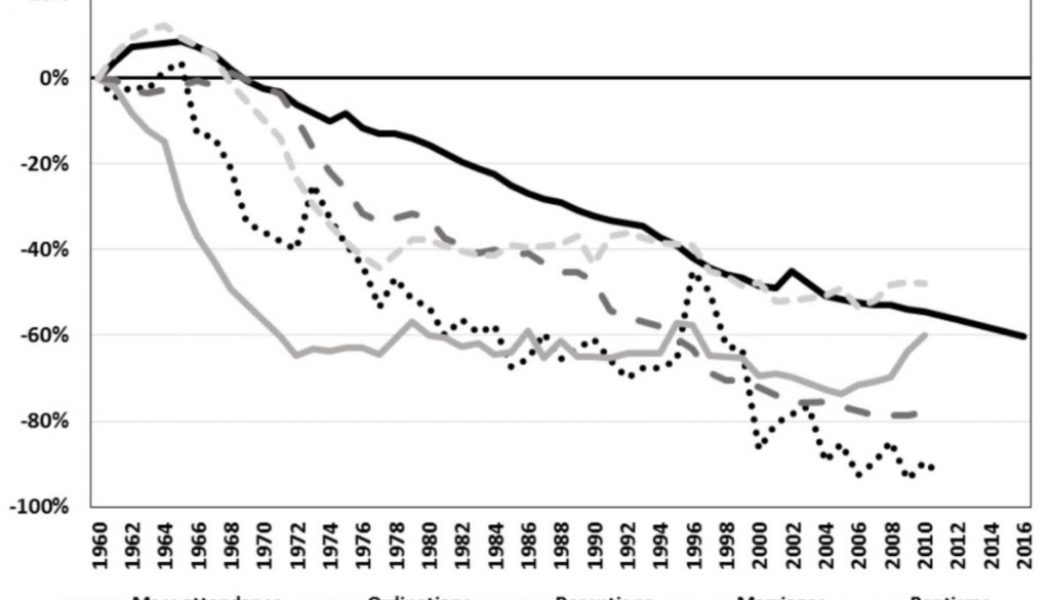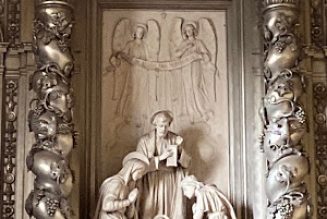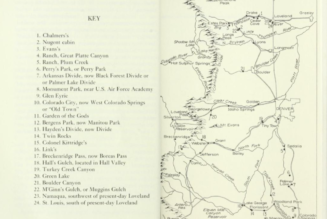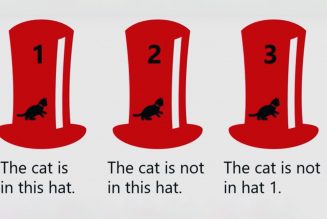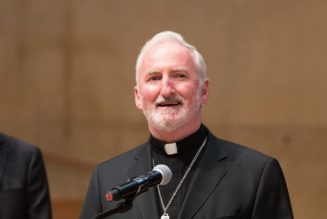Moralistic, therapeutic deism is running on the fumes of authentic red-blooded historic Christianity. When it finally sputters to a halt, what will take its place? The Christian faith in the second half of the twenty-first century will be mystical, mythological, and miraculous, or it will be nothing at all.
A graph posted by Stephen Bulllivant, author of Mass Exodus: Catholic Disaffiliation in Britain and America Since Vatican II, illustrates the alarming decline in the Catholic Church since 1960. Over the last sixty years baptisms, marriages, ordinations, and conversions have all plunged downward like the Titanic.


It is a common complaint among traditionalist Catholics to blame the Second Vatican Council for the disaster, but correlations are not always causes. While the abuses that have come about by the advocates of “the Spirit of Vatican II” are rife, it is hard to ascribe the free-fall of Catholicism only to the reforms of the Second Vatican Council.
On my blog beginning September 15, I’ll be teaching a six-week course which explores the roots of Catholicism’s wrestling match with modernity. The Second Vatican Council was the culmination of a more-than-five-hundred-year struggle with a new worldview—one which overturned the classical understanding of reality. The decline of Christianity in the West is the result of various revolutionary forces—philosophical, political, economic, theological, technological, and cultural. To put the crisis of the barque of Peter down to the iceberg of the Second Vatican Council is to ignore the coal fire in the engine rooms that had been weakening the hull for centuries.
Christianity in the West—and by extension the Christian culture of the West—is reaching the end point predicted by Nietzsche. He saw clearly how the theories of Darwinism and the advance of theological modernism had brought about the “death of God,” and he lambasted his contemporaries for refusing to follow their own theories to their logical end. We are now at the end point, and apart from the fundamentalist Protestants and traditionalist Catholics, the triumph of religion without God is nearly complete.
“Religion without God” is a harsh term for what others have named “moralistic, therapeutic deism.” The modernist theologians of Nietzsche’s time like David Strauss wished to retain the sublime teachings of Jesus while rejecting his divinity. Their descendants have de-clawed the lion of Judah even further by reducing the Christian religion to Rules for Respectability combined with self-help bromides and a vague notion of spirituality. The problem with this religion is that it is not really religion at all. Religion, in every age and for every people in every place down through the ages, has always been a tremendous and terrible encounter with the divine. Religion has always been an approach to the edge of the unknown—Rudolph Ott’s mysterium tremendum et fascinans.
We know there is very little gas in the tank of this counterfeit Christianity. Moralistic, therapeutic deism is running on the fumes of authentic red-blooded historic Christianity. When it finally sputters to a halt, what will take its place? Taking refuge in a worn-out Biblical fundamentalism won’t do, and although I am sympathetic, I doubt whether the full-blown Baroque fantasy offered by Catholic traditionalism will really do the trick. Instead a refreshed form of Christianity will need to emerge—one that looks to the future while grounded firmly in the legacy of the historic faith.
This will require not just tinkering with the liturgical externals or hunkering down in a bunker of fundamentalist anti-modernism. A return to authentic religion will be required.
The Christian faith in the second half of the twenty-first century will be mystical, mythological, and miraculous, or it will be nothing at all. It will be mystical inasmuch as it is metaphysical. In other words, it will reject the narrow-minded dictatorship of materialism and be open once more to the reality of the unseen world. This Christianity will be unapologetic in its embrace of the supernatural dimension. Those of us who believe the unseen world is more real, not less real, than the physical realm will be unembarrassed by a form of practical mysticism that encourages prayer and expects results from the sacraments which are our interaction with the spiritual realm.
This return to the historic faith will also be “mythological”—understanding “myth” not as “a silly untrue fairy tale” but “myth” in its true definition as story or sacred narrative. A religion that is mythological embraces the need for faith stories—which are real historical witnesses to the interaction between God and man. This mythological faith will reject the destructive elements of modernist Biblical criticism while endorsing the positive findings of scholarship. Its embrace of “myth” will include the lives of the saints—both historical and contemporary and will use stories to proclaim the gospel through preaching, but also through literature, film, podcasting, and every modern means of storytelling.
Finally, this faith for a post-post-modern world will be miraculous. The miracles may be astonishing as they were at Fatima and Lourdes, or they may be much more down to earth, as ordinary people come alive again to the reality of God’s working in their lives. How will this miraculous element of the faith return? The answer is simple: As the dead wood in the Christian church falls away (the dead wood being the lapsed, the lukewarm, the cynical, and the merely respectable), those who truly believe in the mystical, the mythological, and the miraculous will remain, and as they practice their full-blooded faith, more miracles will be experienced.
This is the kind of Christian faith that first took the world by storm, and it is the sort of faith we see across Africa and in parts of Asia and Latin America. To witness that faith already on the upsurge in the global South is also to realize that this kind of faith is the religion of the poor, the powerless, and the persecuted. Whether or not Christians in the affluent and jaded West wish to accept this other, more austere aspect to the historic faith—or whether we choose to remain dozy in our affluent cocoons—will be the real test in the decades to come.
The Imaginative Conservative applies the principle of appreciation to the discussion of culture and politics—we approach dialogue with magnanimity rather than with mere civility. Will you help us remain a refreshing oasis in the increasingly contentious arena of modern discourse? Please consider donating now.
The featured image is a detail from “The Triumph Of Christianity Over Paganism” (1868) by Gustave Doré (1832–1883) and is in the public domain, courtesy of Wikimedia Commons. It has been brightened slightly for clarity.
